Table of ContentsClose
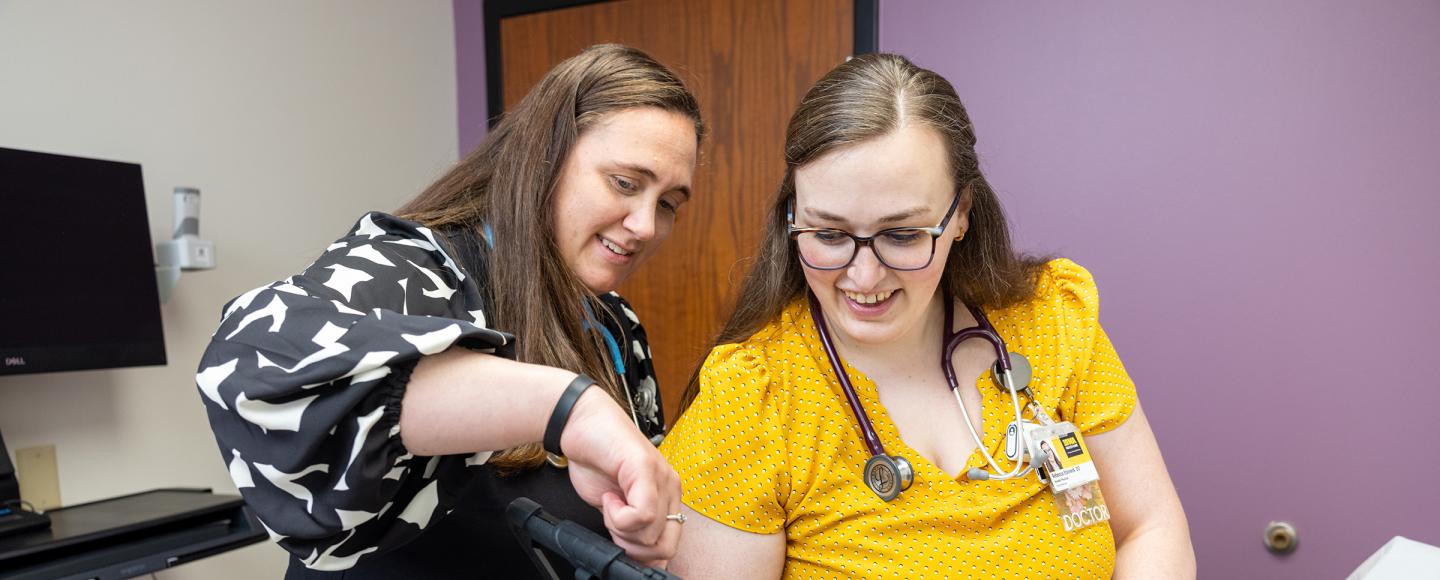
As a third-year resident physician at University of Iowa Health Care’s Pierce Street location in Sioux City, Iowa, Rebecca Steineck, DO, embraces the full spectrum of family medicine training in a community-based setting.
From delivering babies to treating children and adults to caring for patients nearing the end of life, Steineck enjoys the continuity of care she’s developed with patients and families.
“Residency in Sioux City offers great training,” says Steineck, a native of Estherville, Iowa. “By the time we graduate, we are comfortable practicing in rural communities where we truly do it all.”
Once her residency is completed in summer 2026, Steineck plans to pursue fellowship training in obstetrics. Ultimately, her goal is to practice in a rural northwest Iowa community providing inpatient, outpatient, and obstetrical care.
Preserving family medicine training and services in Sioux City
Two years ago, UI Health Care assumed operations of the family medicine practice and family medicine residency training program owned by the Siouxland Medical Education Foundation.
Founded in 1975 as a joint venture between the UI and the MercyOne and UnityPoint hospitals in Sioux City, the family medicine residency program is the only such program in western Iowa. It trains 18 family medicine residents each year, with many of its six graduating residents each year remaining in Iowa to practice. Combined with over 25,000 patient care visits each year, the program has an important presence in the western part of the state.
The Sioux City location was one of five foundational programs that made up the UI-affiliated Iowa Family Medicine Residency Network. Like programs in Waterloo and Cedar Rapids that had closed over the past five years, the Siouxland Medical Education Program had experienced financial pressures. Without UI Health Care involvement, closure of the program was likely.
“It was essential that we maintain this program while also continuing to provide access to care in western Iowa,” says Jeffrey Quinlan, MD, professor and chair of the Department of Family and Community Medicine.
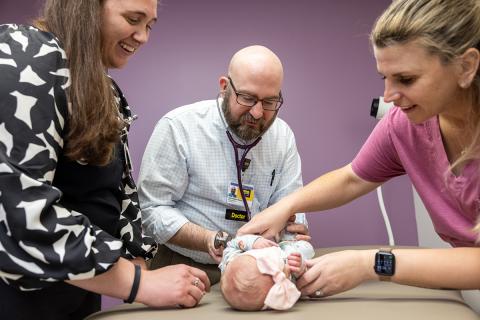
A primary source of primary care
Primary care generally refers to the specialties of family medicine, general internal medicine, general pediatrics, and obstetrics and gynecology. But increasingly in Iowa and across the nation, the balance of providers in primary care specialties leans toward family medicine, according to Quinlan.
“More internal medicine residency graduates are specializing,” he says. “The general internist that we grew up with and who was considered a cornerstone of primary care is less common these days. Nationwide, around 25% of all primary care is provided by family physicians.”
Quinlan cites a few figures outlining family medicine physicians’ statewide impact:
- Family medicine physicians in Iowa provide approximately 70% of all primary care services, followed by general internal medicine providers and general pediatrics providers.
- Almost 60% of obstetric deliveries with patients in rural Iowa are performed by family medicine physicians. For micropolitan areas (communities with populations greater than 10,000 but less than 50,000) the figure is around 41%.
- Approximately 80% of general pediatric care across Iowa is provided by family medicine physicians.
Given these numbers, training future family medicine physicians for Iowa remains more important than ever.

Inpatient family medicine training at downtown campus
After being closed for many years, a 26-bed inpatient unit at UI Health Care’s downtown campus in Iowa City was renovated and reopened in July as a dedicated space for family medicine.
Located at 500 East Market St., the 3 Center unit had remained unoccupied until UI Health assumed operations of the hospital. Today, it provides care for patients who are hospitalized for a range of issues, including heart conditions, diabetes, severe infections, and kidney disease.
The community-based setting also offers residents a more realistic training experience to prepare them for the challenges of practicing family medicine, notes Jessica Rockafellow (16MD, 19R), clinical assistant professor and director of inpatient services in the Department of Family and Community Medicine.
“For residents, it means increased continuity with patients, clearer roles, and greater responsibility as part of a primary care-led model,” Rockafellow says. “As the only resident learners on the unit, they gain more hands-on experience and direct interaction with both family medicine faculty and specialty consultants.”
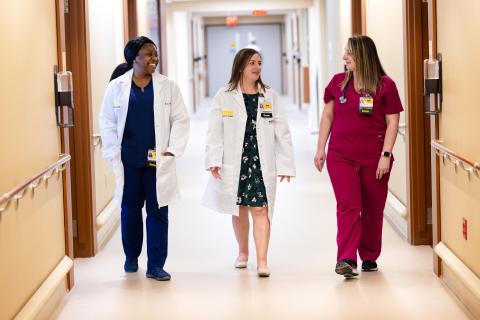
New location will bring greater training opportunities
Another key development as part of a broader effort to strengthen family medicine in Iowa is the relocation of the Department of Family and Community Medicine. This past summer, the Iowa Board of Regents approved plans for UI Health Care to lease an approximately 33,900-square-foot medical office building in northeast Iowa City as the department’s new home.
Located on Northgate Drive near the Dodge Street exit to Interstate 80, the building is roughly 5 miles from the department’s current location in the Pomerantz Family Pavilion on UI Health Care’s university campus.
The Northgate Drive facility had served as a community orthopedic clinic with ample surface parking and convenient access for patients, faculty, and staff. Other than information technology upgrades and improvements and modifications to meet Joint Commission and Accreditation Council for Graduate Medical Education requirements, the building does not require extensive renovations.
The new location will feature 41 patient exam rooms (an increase of 25 exam rooms from Pomerantz Family Pavilion) plus clinical lab services. It will serve as the center of the Department of Family and Community Medicine’s residency program — 44 residents in training each year (24 residents in family medicine and 20 residents in a combined family medicine-psychiatry program).
Most of the department’s faculty and staff on the university campus will move to the new site. Plans are for the new facility to open this year.
“This new location will make it much easier for patients to reach us and for our teams to serve the community,” Quinlan says. “And it will allow us to train our residents in an environment similar to where they will go on to practice.”
Family medicine training in action
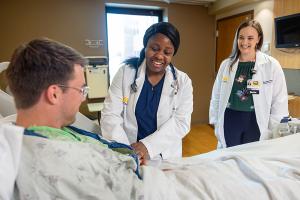
‘One of the things I get to do more of [at the downtown campus] is maternal and newborn care, as we are the main providers for our mother and baby service. We get to work closely with the midwives and get so much experience in newborn resuscitation.’
—Ofure Omokhodion, MBChB, resident physician
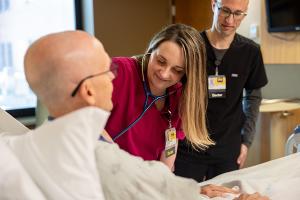
‘As a resident, [the downtown campus] will offer a unique blend — maintaining access to the mentorship resources of an academic setting while giving me the chance to build deeper connections with patients in a more community-based setting.’
—Sarah Costello, MD, resident physician
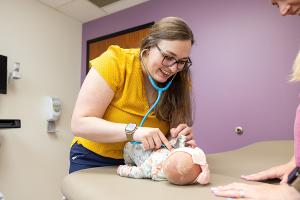
‘Residency in Sioux City offers great training in full-spectrum rural medicine. After fellowship, I plan to stay and practice in rural Iowa doing a mix of inpatient, outpatient, and OB.’
—Rebecca Steineck, DO, resident physician
Building on a family medicine tradition at Iowa
The UI Department of Family Practice was created in 1971 under the leadership of Robert Rakel, MD, who led the department through its first 15 years.
Rakel was a pioneer in terms of integrating family practice into academic medicine. He established one of the nation’s first family medicine residency programs in California, and the training program he helped build at Iowa was among the first 25 in the country. Rakel also published more than 50 books, including the first edition of Family Practice, one of the first textbooks covering what was then considered a new specialty.
For Quinlan, the legacy in the Department of Family and Community Medicine builds upon the work of Rakel and other family medicine leaders, faculty, and staff at the UI.
He acknowledges that the future of family medicine across Iowa will require continued efforts and programs to get medical students interested in family medicine and provide them with opportunities to experience what it’s like to practice in smaller- and medium-size communities outside of the state’s larger cities.
In the Carver College of Medicine, these opportunities include:
- MECO (Medical Education Community Orientation), which introduces rising second-year medical students to family medicine, OBGYN, pediatrics, and other specialties in a community hospital setting. Through hands-on experiences, students are better prepared for the clinical work they’ll encounter in their second year.
- A family and community medicine clerkship, a six-week required rotation to introduce students to family medicine and the intersection of ambulatory care and local communities. Second- and third-year students spend four weeks with a family physician in a community-based practice and two weeks at one of five regional medication education centers across the state — in Davenport, Des Moines, Mason City, Sioux City, and Waterloo — which are the UI-affiliated family medicine residency sites. Over 200 family medicine doctors at nearly 70 practices across Iowa participate in the core clerkship program.
- Advanced elective courses for third- and fourth-year students, which are available in Iowa City and additional locations across Iowa. These include family medicine-psychiatry, sports medicine, geriatrics, and maternity care.
“It’s important that we give students and trainees experiences that are informative but also meaningful in a way that encourages them to consider staying and practicing family medicine here in Iowa,” Quinlan says. “It’s important for the health of patients and for the health of the communities they live in. We need to keep it going."

Fostering rural-based research
Research remains a priority in the Department of Family and Community Medicine. The department has added two research-focused faculty members and established a research fellowship over the past three years.
Research collaboration also is key. UI College of Pharmacy associate professor Korey Kennelty, PharmD, who also holds a faculty appointment and serves as vice chair for research and implementation science in the Department of Family and Community Medicine, recently received a major grant from the nonprofit Patient-Centered Outcomes Research Institute, or PCORI. Working with family medicine researchers and local pharmacists in rural Iowa communities, Kennelty will study remote monitoring practices for managing hypertension and whether this approach will improve care outcomes while making it easier for patients and providers.
